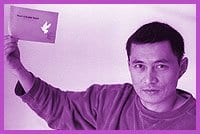In 1988 Xiaoping Li was living in his homeland of China facing a wall of injustice that blocked his future. He was a gay man in a country that officially declared itself free of homosexuality.
“I realized that I was gay, but homosexuality was totally a taboo in China,” Li says. “They said it was part of the Western decadent society. I thought I had no future so I came to Canada.”
Fifteen years later and Li is witness to what he sees as another injustice in the imminent war on Iraq. A reluctant activist, he is standing up to say no to the war.
At the media committee meeting of the Coalition To Stop The War, the group that organized the Feb 15 rally and march in Toronto, he was the only Chinese person and the only openly gay person.
While his current mission is to spread the anti-war message to the gay and Chinese communities, he insists that he does it not primarily as a gay or Chinese man.
“I have done some things in the gay and lesbian community and I have done some things in the Chinese community,” he says. “But I felt that I need to step out of my own ethnic, minority or special interest group and really be a responsible citizen in the country and a global citizen. To do my part.”
One of his contributions to the current anti-war movement has been to design and produce, with the help of artist Aries Cheung, a postcard that comes with the suggestion to send it to the prime minister. (You can check out the postcard at www3.sympatico.ca/xiaoping.li.)
Despite trying to separate being gay and Chinese from his anti-war stance he sees a number of historical and personal parallels that moved him to action.
Li does see links between queer politics and anti-war politics. There is a similarity between current propaganda about Iraq and the historical lies told about gay and lesbian people. The recent reports that the British government used facts and figures lifted from an out of date academic paper to make the case against Saddam Hussein struck Li as symptomatic.
“It was in one way hilarious and in one way very horrible,” he says. “This is the sort of power dynamics, the power display of a stronger power who wants to quash a weaker power. I think it is the same in the gay and lesbian community…. Initially the heterosexual community, they had all this power and they were fabricating any excuse to say ‘you are evil.’
“I’m all for the underdogs. There is also a sense of justice here. Being gay or lesbian or transgendered or bisexual you are repressed by the mainstream media and you seek justice, you seek fairness. It is not that I’m pro Saddam, but I think I’m pro justice and fairness and this war can be avoided.”
Another powerful parallel for Li comes from his family. He grew up in China and lived with his grandmother who told him stories of the Second World War and how she had to flee into the countryside with her five children, including Li’s mother, as Japanese bombers dropped their deadly loads on the cities.
“I imagine there are many women and children [in Iraq] who are just like my grandmother and my mother and her siblings,” Li says. “They will be just so scared and they will suffer and I think that is very sad.”

 Why you can trust Xtra
Why you can trust Xtra


